Result Oriented and Most Affordable
UPSC, UPPCS and BPSC
Coaching Center in Varanasi
Before you commit to any coaching center in Varanasi for BPSC, UPPSC, or IAS Preparation, take a moment to knock on every door. Then, when you're ready, come to us. At Dhyeya IAS, because we have a proven strategy and plan to crack the IAS/PCS exam. Our focus is not just on completing the syllabus; we focus on your wrong strategies and weak points. Because we're driven by your dreams. Join Dhyeya IAS, and together, let's turn your aspirations into achievements. Your journey matters to Dhyeya IAS.
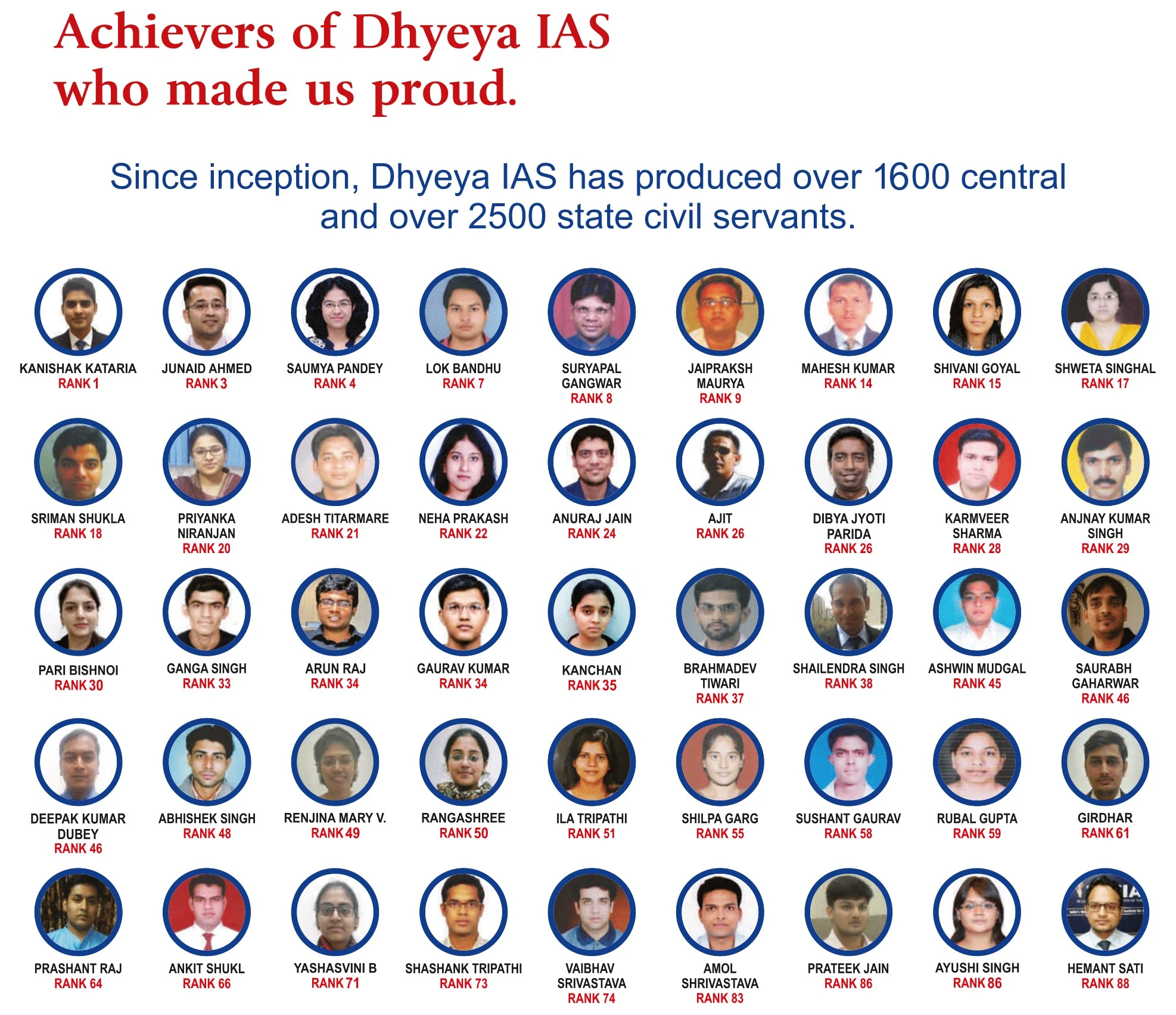
Why Dhyeya IAS Result Oriented & Most Affordable Face to Face IAS /PCS Program
🚔 If you have the aptitude and courage to become an IAS/PCS officer, we have proven strategies and plans for you to become an IAS/PCS officer.
Virtual Tour of Dhyeya IAS Varanasi Centre
Click and Enter in Dhyeya IAS Varanasi Coaching Center
🚔 If you have the aptitude and courage to become an IAS/PCS officer,
we have proven strategies and plans for you to become an IAS/PCS officer.
 Dhyeya IAS UPSC CSE Toppers
Dhyeya IAS UPSC CSE Toppers
Best IAS Coaching Center in Varanasi
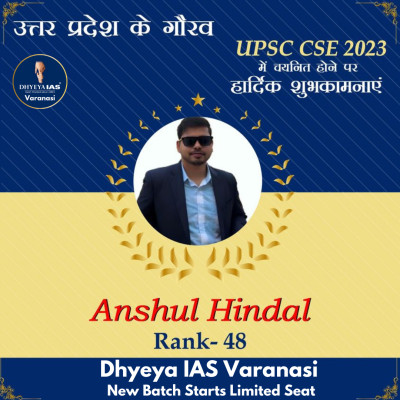

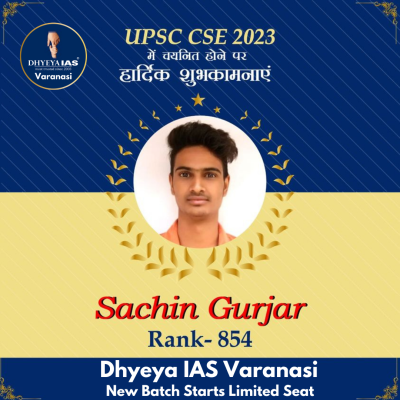


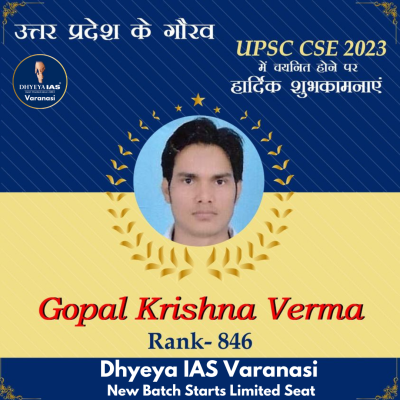

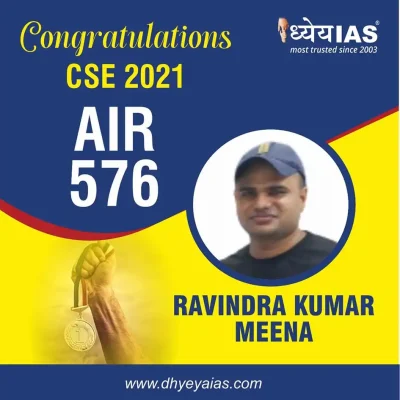
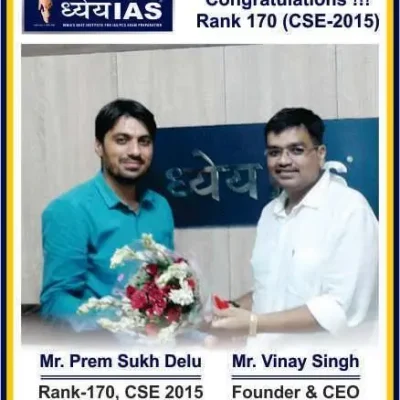



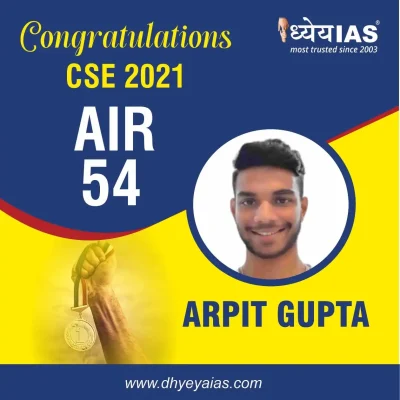


🚔 Dhyeya IAS UPPSC Toppers
Best UPPSC Coaching Center in Varanasi
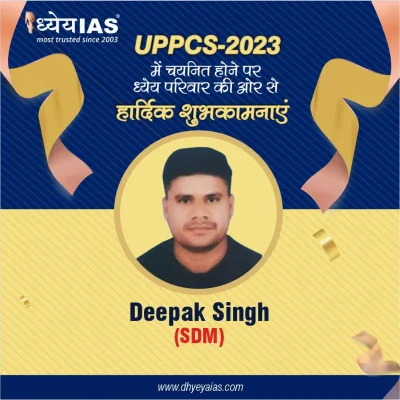
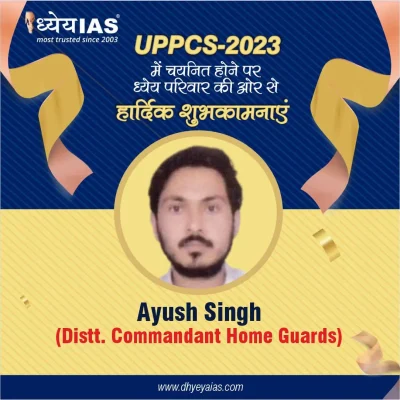


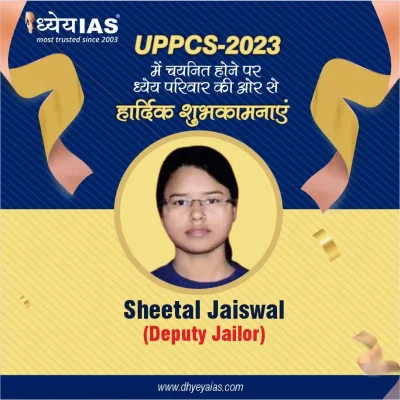

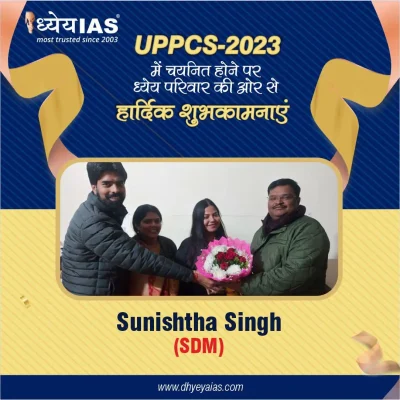
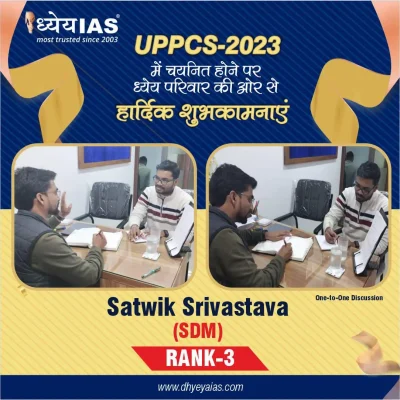






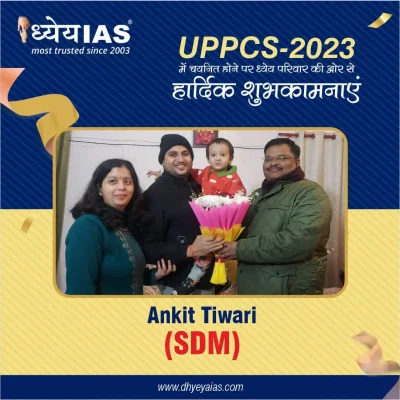
 Dhyeya IAS BPSC Toppers
Dhyeya IAS BPSC Toppers
Best BPSC Coaching Center in Varanasi
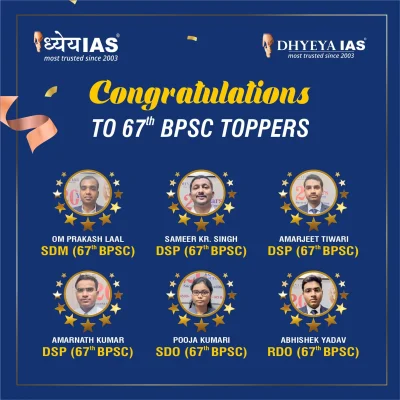

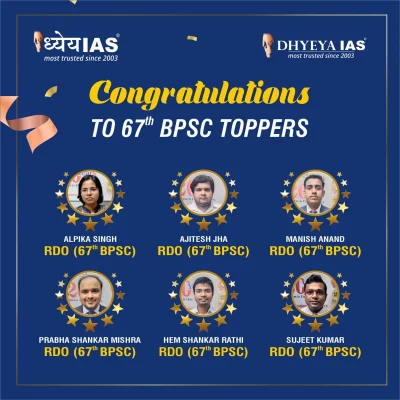
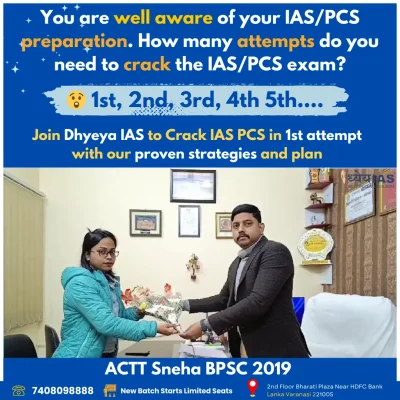
🚔 If you have the aptitude and courage to become an IAS/PCS officer,
we have proven strategies and plans for you to become an IAS/PCS officer.
Setting a new Milestone this year
Best IAS/PCS coaching in Varanasi, Dhyeya IAS has earned a stellar reputation for its result-driven approach and holistic education model.
Roshan's journey is not just about personal success; it's a testament to the collective aspirations of a nation. Join the league of extraordinary achievers at Dhyeya IAS. With our proven track record and unwavering commitment, success isn't just a dream – it's a promise. Let's make it happen, together.
Roshan's journey from Bihar PCS to being selected as a SDM is truly inspiring. Despite coming from a middle-class background, he persevered through challenges, always seeking guidance and assistance. His commitment to serving the nation and fulfilling dreams resonates deeply. His story is a beacon of hope, reminding us. Join Dhyeya IAS for BPSC preparation in Varanasi.
Additionally, I underwent mock interviews where I received feedback on my strengths and weaknesses, which proved highly beneficial. In a world of uncertainty, find certainty in your aspirations with Dhyeya IAS. Together, we'll navigate the challenges and carve out a future that's uniquely yours. Your journey awaits. Join Dhyeya IAS for UPPSC Presentation in Varanasi.
Hello everyone, my name is Ashish Kumar Seth and this year I have been appointed as a Tax Assessment Officer, and for this, I am grateful to Dhyeya IAS Varanasi. They provided me with guidance for prelims, mains, and interviews. Especially for mains and interviews, where I stayed in Varanasi and wrote many tests at the center. The mentor not only had one-on-one interactions with me but also gave me insights and strategies to improve my marks.
🚔 If you have the aptitude and courage to become an IAS/PCS officer,
we have proven strategies and plans for you to become an IAS/PCS officer.
Dhyeya IAS Varanasi Classroom Program
Our highly qualified and experienced faculty members developed distinguished strategy to cover different topics in a well defined manner. We assist aspirants to develop crystal clear concepts and interdisciplinary approach to crack this most prestigious exam. Our innovative teaching techniques create a reliable road map to candidates’ goals. We fulfill dreams and expectations while nourishing the ingredients of hard work, determination, confidence, right direction, exam cracking strategy. We work pro-actively to improve candidates’ performance with rapidly changing patterns of IAS/PCS exam.
GS PREMIUM BATCH (Prelims + Main + Interview) Duration: 12 Months
- Development of Integrated and Interdisciplinary Approach.
- Regular class tests.
- Writing skill Development.
- Proper guidance and feedback at personal level.
- Value Addition Programmes before IAS Prelims and Main Examination.
GS MAINS BATCH (Mains+ Interview) Duration: 8 Months
- Development of Conceptual Understanding at Advance Level & Interdisciplinary Approach.
- Application and Value Addition on Regular Basis.
GS MAINS UPGRADATION BATCH (Value Addition for Main & Interview) Duration: 2½ Months
- Quick revision of important sections of General Studies.
- Focus on writing skill development.
GS FOUNDATION BATCH (Concept Development) Duration: 6 Months
- Development of basic understanding of General Studies for IAS Exam and complete preparation for state PCS exams and other exams conducted by Union Public Service Commission such as IES, CPF, CDS etc.
- Special focus on under-graduate students.
CSAT BATCH (Prelims) Duration : 4 Months
- Concept Building & Clarification.
- Special Practice Session & Mock Tests.
Interview Programme
Success and rank of an aspirant is determined significantly by this last but very important segment of exam process. The purpose of interview is to assess candidates’ suitability for a career in public service by a board of highly competent, knowledgeable, experienced and unbiased members who have excellent career profile. Through this programme we prepare the candidates to exhibit not only the art of balanced and precise thoughts but also the art of communicating them effectively. Immediately after Main Exam result we organize Interview Training Programme each year. Experts of our institute work on individual basis for personality improvement through training sessions and mock interview sessions.
Don't let your dreams take a backseat. Join Dhyeya IAS Coaching Centers in Varanasi, to take your dream fly.
🚔 If you have the aptitude and courage to become an IAS/PCS officer,
we have proven strategies and plans for you to become an IAS/PCS officer.
What sets Dhyeya IAS apart from other institutes?
Because of our most affordable program & continuous results.
🚔 If you have the aptitude and courage to become an IAS/PCS officer,
we have proven strategies and plans for you to become an IAS/PCS officer.
Dhyeya IAS Faculties
None of Dhyeya's centers has its own teacher. At all the centers of Dhyeya, teachers come from the head office only. And after studying the target topic, they go to another centre.
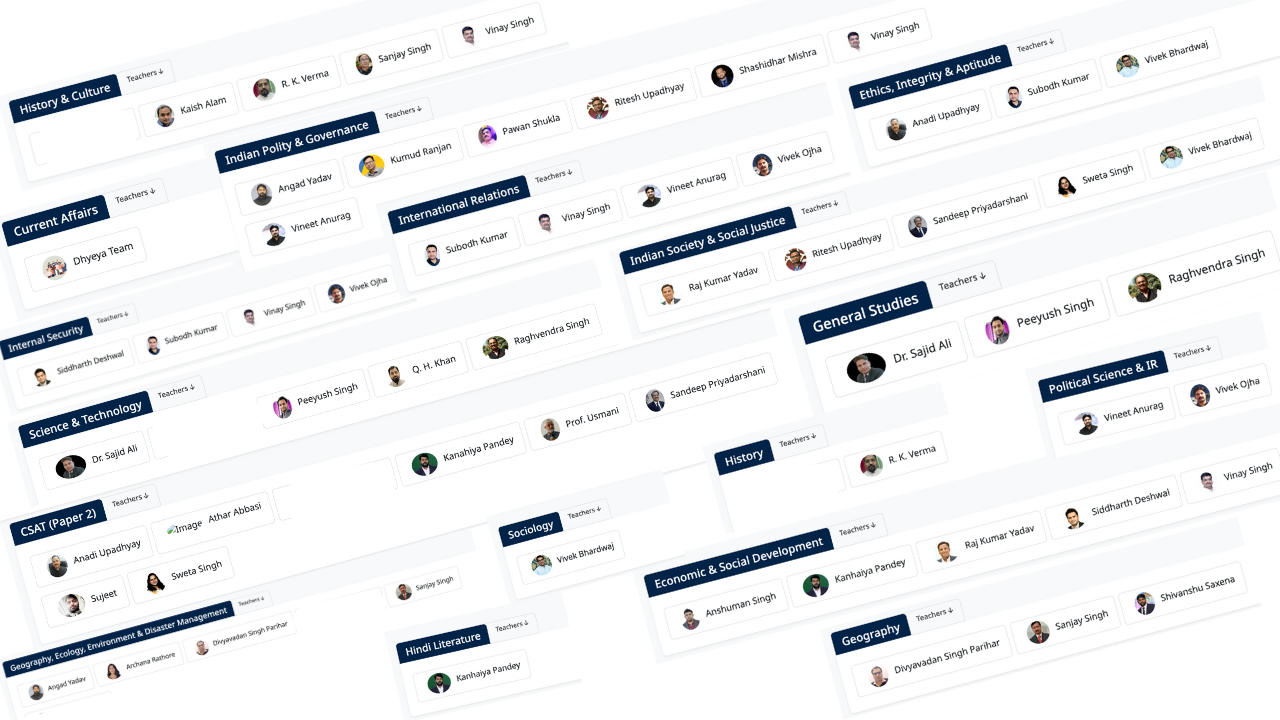
Smile of Success
आपकी जीत सिर्फ आपकी नहीं है कई और लोगों की जिन्दगी का आधार है
Dhyeya IAS Make it Possible
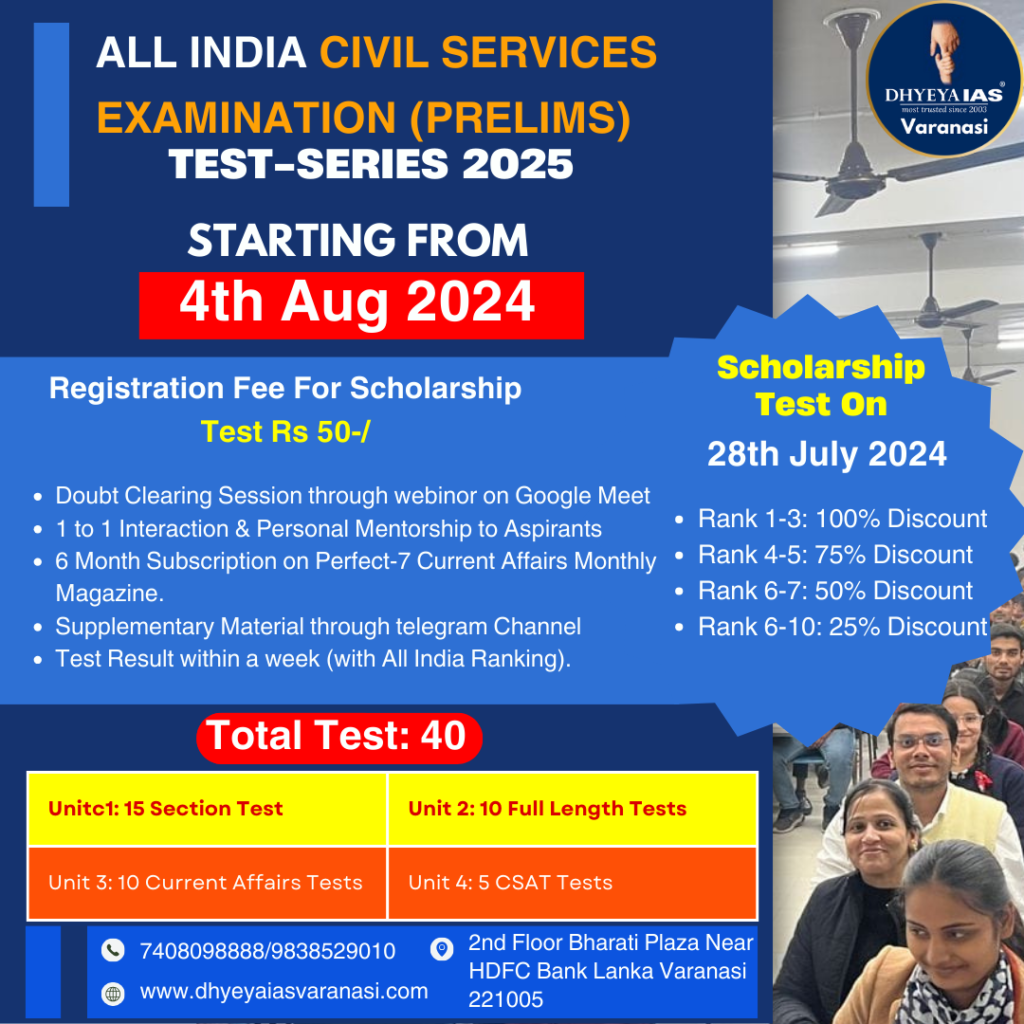
Dhyeya IAS All India Test Series 2024 Starts Join Now
Media & Newspaper

🚔 If you have the aptitude and courage to become an IAS/PCS officer,
we have proven strategies and plans for you to become an IAS/PCS officer.
FREQUENTLY ASKED QUESTIONS
Before you commit to any coaching center in Varanasi for BPSC, UPPSC or IAS Preparation, take a moment to knock on every door. Then, when you’re ready, come to us. At Dhyeya IAS, we don’t just focus on results; we’re driven by your dreams. Join us, and together, let’s turn your aspirations into achievements. Your journey matters to us.
Both English and Hindi
Yes! You can take 3 days of demo classes.
Experience the power of knowledge with three days of demo classes. It’s not just about learning; it’s about igniting your potential and shaping your destiny.
All our faculty members hail from the esteemed Dhyeya IAS Delhi Head Office, bringing with them a wealth of experience and a commitment to your success. Rest assured, you’re not just joining a coaching center; you’re becoming part of a journey fueled by expertise, dedication, and unwavering support.
Need not be afraid of applying for the Civil Services Exam because UPSC give following options in this respect:
You – If you opt to write the Civil Services Main Exam in English, you may choose either English as the medium for interview or Hindi or any other Indian language opted by you for the compulsory Indian Language Paper in the written part of civil services mains examination as the medium for interview.
However, if you are exempted from the Compulsory Indian Language paper, you will have to choose either English or Hindi as medium of interview.
– If you opt for the Indian Language medium for the written part of the Civil Services Main Exam, you can choose either the same Indian Language or English or Hindi as the medium for the Interview or Personality Test.
No, an attempt will be counted only if you have appeared in at least one paper.
No, only candidates belonging to communities which are included in the Central list of OBC’s are eligible for such concessions.
Yes, you can choose any optional subject from amongst the UPSC’s list of optional subjects for Civil Services Main Exam.
No, you have the option to write your answers either in English or in any one of the languages included in the Eighth schedule of the Constitution.
Yes, previous years’ papers help the candidates to know the trend and they must go through these papers again and again.
Total marks are considered.
– You can assess the level of competition from the following data:
– No. of vacancies advertised every year: Around 1000.
– No. of candidates who fill the form: More than 10,00,000
– No. of applications who appeared in the Preliminary exam. : Almost 4,50,000-5,00,000
– No. of candidates who qualify the Prelims and become eligible to appear in the Mains Exam: Equal to 12 to 13 times the nos. of vacancies of CSE.
– Nos. of Candidates who qualify Mains to appear in the Interview: 2-2½ times the Nos, of vacancies in the CSE. Thus one can say that CSE
is one of the toughest competitive examinations.
Candidates possessing professional and technical qualifications which are recognised by the Government as equivalent to professional and technical degree would also be eligible for admission to the examination.
Candidates who have passed the final professional M.B.B.S. or any other Medical Examination but have not completed their internship by the time of submission of their applications for the Civil Services (Main) Examination, will be provisionally admitted to the Examination provided they submit a copy along with their application a copy of certificate from the concerned authority of the University/Institution that they had passed the requisite final professional medical examination, along with their application. In such cases, the candidates will be required to produce at the time of their interview original Degree or a certificate from the concerned competent authority of the University/Institution that they had completed all requirements (including completion of internship) for the award of the Degree.
The minimum cut off marks for Paper 2 is 33 percent. The Commission may fix a minimum cut-off mark for Paper 1 too.
There will be negative marking for incorrect answers for all questions except some of the questions where the negative marking will be inbuilt in the form of different marks being awarded to the most appropriate and not so appropriate answers for such questions.
Most of the questions in the general studies paper in Prelims and Mains are related to Humanities background. But it is neither necessary nor advisable to take Humanities as your graduation stream just to clear UPSC exam. Graduation should be based on your interest – it can be humanities, science, engineering, literature or management. For graduation, select any stream you like to study for 3-4 years. You are free to choose any optional subject for UPSC Mains and it may not be the one you studied for graduation.
The Commission has the discretion to fix qualifying marks in any or all the subjects of the examination. Since 2015, the minimum mark
were 25% for Indian language and English language. For GS1, GS2, GS3 and GS4 the minimum marks expected are 10%.
If a candidate’s handwriting is not easily legible, a deduction will be made on this account from the total marks otherwise accruing to him.
This is one of the most frequently asked questions. UPSC has been constantly changing its pattern over the years to make the civil services exam preparation accessible and possible to students from every set of backgrounds. Its endeavor is to neutralize the effect of coaching so that all candidates come on an equal platform. However, the fact remains – most of the candidates who succeed have taken coaching at some point of their preparation. This is chiefly due to:
- The vast syllabus, especially in general studies which the candidates find very difficult to do on their own in a shortest possible period. Moreover, the students are flooded with so many books that they get confused about consulting which ones. Class notes and Material provide a solution to this.
- The candidates many times in their quest for acquiring knowledge lose track of time. They overdo the studies in some subjects at the
cost of others. Coaching institutes cover the syllabus within the time period and thus are sought after. However, the need for coaching could be removed wholly if the candidates could get the right study material and the right guidance for the examination.
A word of caution also needs to be included here. If a candidate has made his mind to enroll himself in any coaching, he must go for the best reputed ones. There are many coaching institutes which advertise very attractively, boasting on claims for producing toppers, which is many times false. The candidates who get attracted eventually land up in these institutes which take a toll on their valuable time, money and energy. The candidates must personally make queries about the coaching institutes, asking the students who were previously enrolled and then, only making right decisions.
Nothing could be better than this. However, the problem comes when one considers the wide syllabus, which is too vast if we include two optional papers and the general studies which in turn comprises so many subjects.
One can decide to pair his own notes in those areas in which one is weak, or there are many sources to consult, or on those topics which are very important from the examination point of view. Otherwise, it will be a Herculean task to prepare notes on individual topics.
But those candidates who have decided to appear in civil services exam during their graduation years may go for this as they have ample time to contribute.
The answer is as many hours as you can study efficiently. In civil services preparation, there is never a time when one feels that there is
nothing more to study. So, what exactly matters is the quality of studying rather than quantity of reading. First the difference between
‘Studying’ and ‘reading’ should be understood. Reading means mere verbalisation of the written texts. What lacks here is understanding.
When understanding adds to ‘Reading it becomes ‘studying’. So the issue how many hours you can sit and read the text with
understanding also connotes to analysis, deep processing of information, inter-relating with your past knowledge base and making a
view on the topic. Reading on the other hand is merely a passive activity where involvement of the reader is the least.
We can thus conclude that studying for 8 hours is many times more fruitful than reading for 16 hours. That is to say ‘Quality’ is more important than the ‘Quantity’ invested.
Bio-data matters during the interview and personality test (i.e. during the third phase). Personality test is based wholly or mostly on the basis of bio-data and the questions are framed on information provided by you. In fact, the-then personality is judged by the interview board on the parameters of suitability of candidates for the job. However, a bad bio-data may give some unfavorable impression on the members of the board and thus, a kind of judgment is formed by them consciously or unconsciously.
At the same time the members of the board are very experienced and they give full opportunity to candidates to thwart any pre-notions formed by the bio-data. So, the candidates by their performance in the interview have a full opportunity to score high in the Interview. But, the idea is that those candidates who are in their early academic years should try and see that their biodata is without any shortcomings.
Yes, aspirants can write answers in any language provided in the eighth schedule of the constitution of India.
Can knowledge be compartmentalized? No. In fact it is an integrated whole which gives a comprehensive understanding. Same holds true for the preparation. The whole subject should be understood in its entirety. Only then the requirement for the Preliminary and Mains could be fulfilled through particular emphasis on the orientation. The orientation for Prelims is towards a mix of factual information and understanding with a bias towards the former.
This has been answered earlier too. The basic criteria are in the same sequence of importance.
Interest.
Availability of study material and guidance.
Gap between the optionals during the Mains exam.
Scoring optionals – trend prevailing.
UPSC holds personality tests and interviews in English, Hindi and all other languages in the 8th schedule – i.e. 22 languages, provided the
candidates write all the papers ()optional and general studies) in the same language. Also, UPSC through the Civil Services exam tries to
dig out the best brains in the country, who could contribute to the development and progress of the nation. It is thus a wrong notion to hold
that the UPSC is language-biased. However, the candidates themselves need to learn English for their own sake as during their long
career in civil services they have to come across so many occasions where they will have to communicate with various kind of
organizations, institutions, seniors and people and during such a situation, language should not be a limitation.
Generally, we see most of the people around us who are not selected. Seeing them, your self-confidence should not be reduced because everyone has a different strategy. We should always remember that most of the candidates who are finally selected are also from us.
Failure can be for several reasons:
- Time is limited in the examination hall, despite being aware of the questions, one is not able to express correctly because one has not practiced properly.
- Pressure management just before the examination is not done properly, so that the answer to the known question with the correct information goes wrong too.
- Lack of Right Guidance on strategy.
No assessment of ability of an aspirant regarding time management, use of fact and writing style.
Solution
Keep a positive view, meet successful people, ignore negative thoughts.
Do not lose your self-confidence, you have immense potential to use it to achieve your goal honestly.
- Identify your short-comings and try to remove them. Go ahead with your determination by choosing your own way.
Family pressure is high on girls due to which there is no consideration in studies, what to do for it.
Stay focused on your goal, concentrate with your full passion and energy to achieve your goals.
- Take your parents and family in confidence which will in turn help you achieve your goal.
- If success is achieved in the 1st stage, the trust of the parents and family increase and therefore work hard to achieve the goal in the first go itself.
One or two standard newspapers are enough. (The Hindu / Indian Express / Business Standard or Economic Times).
Combine the current developments with issues and topics, to know the relevancy of the events. As most of the questions are based on contemporary issues.
Note the key facts of the events, which will be highly beneficial in preparation.
Note the events in a register according to GS Paper wise. Under the headings of National, International Economy and Ecology and Environment.
Note the key points of important editorial articles that are essential for the main examination. (specially in Essay)
Well, for the preparation of the IAS Exam, one or two years of intensive study is required because the syllabus is very wide and it is also necessary to have an understanding and hold on the subject. But with the right strategy, better guidance, perseverance it can be done in
one year also.
Aspirants family background, academic ability and his basic understanding, plays a very decisive role. If everything is positive and favorable then success can be achieved even in one year by hard work.